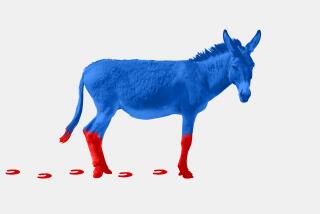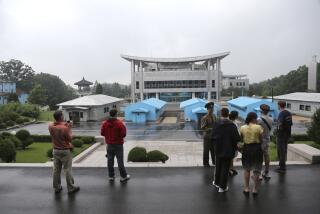In Cuba, More Improvising Than Uprising
- Share via
CONSOLACION DEL SUR, Cuba — At the end of a broken-brick path, in a two-room cinderblock hut strung with laundry and a single lightbulb, lives a family targeted by new U.S. sanctions intended to stir Cubans into righteous anger against Fidel Castro.
The patriarch, Miguel Soler, is 88 and paralyzed by a stroke. His wife, 84-year-old Maria Teresa Rodriguez, is still recovering from a heart attack suffered this spring. Their daughter and son live in Florida, and the couple are afraid they will never see them again.
“My daughter is crying all the time when she calls,” said Rodriguez, tearful herself. She worried the hem of a cotton housecoat already worn to translucence, fretting over new restrictions that limit U.S. residents’ visits to family members in this Communist Party-ruled country to once every three years. “I’m sick, and we both know what it means if she can’t come here for three more years.”
Far from rising up against Cuba’s communist system, she’s focusing on her immediate needs. With a household income of $16 from a daughter still living with them, Soler and Rodriguez have been receiving about $200 more each month from their emigre children via Cuban American travelers. With more than 115,000 of them visiting the island nation last year alone, a thriving network has developed to relay cash to needy loved ones around the country, enabling the providers to avoid transfer charges that can amount to 15% of wired remittances.
Cuban Americans, who usually bring suitcases stuffed with food and toiletries, now will have a luggage limit of 44 pounds. Under the new restrictions, which took effect June 30, they also will no longer be allowed to send money to relatives outside their immediate families.
The couple’s children are responding like most relatives in the U.S.: They’re searching for ways to get around the restrictions by sending money through third countries and vowing to visit whether the sanctions allow that or not.
Javier Arrenciano, a 30-year-old Miami construction worker visiting his 6-year-old son and ex-wife in a neighboring village, expressed a mixture of defiance and anxiety over the new regulations. Having traveled to Cuba this year, he is legally ineligible for another trip until early 2007.
“That’s what the law says,” Arrenciano, who won a visa lottery five years ago, said as he sought to calm his despondent son. “He’s upset because I’m leaving tomorrow. There’s no way I won’t see him again for three years.”
Waitress Marta Lopez had been getting $50 a month from a cousin in Hialeah, Fla., who will no longer be able to send it because remittances now can be sent only to one’s parents, siblings or children. But the 31-year-old mother, whose state salary is worth about $6 a month, said she got this month’s payment via relatives in Spain who are acting as go-betweens.
“The government of the United States is controlled by the Cuban mafia in Miami, but not the people,” Lopez said as she wiped a worn wooden table at the Cafe Verano. “They will continue to send us money and visit us as often as they want to. These barriers are nothing more than a nuisance.”
That attitude is broadly shared among Cubans, who note sardonically that the restricted definition of family would prohibit the Florida relatives of 10-year-old Elian Gonzalez from sending money to the famed castaway if he were in need.
Even among more affluent Cubans, the overriding response has been to predict that the new measures will backfire politically by dividing the Cuban American vote in November’s presidential election.
The notoriously anti-Castro Cuban community in southern Florida is now divided between a hard-line minority that supports the U.S. crackdown and those who arrived in the last two decades and have maintained closer ties to family in Cuba.
“These measures are a mistake from the standpoint of the Bush administration because they have split the Cuban American community in Miami for the first time,” said Bernardo Benes, a retired banker and longtime exile in Miami who negotiated the release of 3,600 Cuban political prisoners in 1978. He also brokered the watershed agreement a year later that allowed emigres to visit their homeland.
Benes noted that more than 1.5 million seats were sold on the U.S. charter airlines that ferried homesick visitors to the island -- until July. In recent weeks, as previously authorized travel waivers expired, the traffic between Miami and Havana has withered to zero. Those defying the curbs are now routing themselves through the Bahamas, Jamaica, Mexico or Canada.
Arrenciano, the Miami builder, lamented only the extra cost of flying via a third country, not the violation that could get him slapped with a $7,500 fine if he visits without authorization and gets caught. He said he was more concerned about radical exiles finding out about a violation than the U.S. government, as the most ardent anti-Castro groups have been known to seek retribution against anyone seen as giving succor to the regime.
But unlike previous U.S. government attempts to step up the economic pressure on the Havana regime, the limitations on family visits, remittances and the volume and value of gifts have stirred discontent in Miami as well as Cuba.
Caravans of hundreds of horn-honking, banner-waving protesters have been periodically converging on downtown Miami even before the tighter curbs took effect. Impassioned groups also have picketed the Miami offices of anti-Castro Cuban American officials, including Reps. Ileana Ros-Lehtinen and Lincoln Diaz-Balart, the latter a former nephew-in-law of Castro. “You’ll Hear From Us in November!” one placard threatened.
A poll last month of Cuban American voters in four southern Florida counties showed a significant drop in support for President Bush among the community that gave him 82% of its vote four years ago and provided the deciding edge in his razor-thin victory in the state. Only 66% of Florida Cubans now support Bush, according to the poll commissioned by the William C. Velasquez Institute, a nonprofit, nonpartisan Latino voter research group.
Whatever the outcome of the U.S. presidential election, Cubans say, the legendarily stubborn and defiant people who inhabit this island nation will get what money their U.S. relatives are willing to give them.
“No one will succeed in dividing Cuban families,” said Juan Carlos Oliva, the brother of retired Minnesota Twin slugger Tony Oliva, who for four decades has been the patron exile of this town tucked among sugar-cane fields in Pinar del Rio province.
Because of the former batting champ’s annual visits and trunkloads of gifts for family and friends, Consolacion del Sur has enjoyed more comforts than its neighbors. Sports equipment, eyeglasses and clothes from Target and Wal-Mart are visible on the streets and playgrounds.
Officials in Havana scoff at the attempt to stir anti-communist unrest by targeting families.
“Some people will comply with the regulations, but I’m sure the majority will try to avoid them. This is about families, and for Cubans, family is very important,” said Rafael Dausa, head of North American affairs at the Foreign Ministry.
Havana’s bustling hotels, bars and plazas show no ill effects from the U.S. limits, thanks largely to a continuing boom in European tourism to the island. Visits and revenue rose 13% last year, surpassing remittance income for the first time since the 1959 revolution.
At the Hotel Parque Central, where U.S. citizens on cultural and humanitarian visits made up 90% of the clientele less than two years ago, occupancy continues to grow with the influx of Canadians, Britons, Germans and Spaniards, Director-General Victor Zafer Donmez said.
“We have always been glad to welcome our friends from the United States, but if they don’t come, we’ll make do with other guests,” said Donmez, a Dutch citizen in charge of the hotel, which, like most high-end accommodations in Cuba, is a joint venture of the government and a foreign investor.
Indeed, the anecdotal evidence in these early days of the new measures suggests that there has been no effect on income or social outlook yet.
At the busy Western Union office in Old Havana, clerk Marlene Clemete said she had the impression that remittances were on the rise as Cuban Americans scrambled to send as much as they could before the new rules kicked in. Some have been ferrying in more money than usual to provide a cushion.
“Cubans will always find a way to help their relatives,” Clemete said, spreading her hands as if taking a bow for fellow Cubans’ pluck against their powerful neighbor.
More to Read
Sign up for Essential California
The most important California stories and recommendations in your inbox every morning.
You may occasionally receive promotional content from the Los Angeles Times.











